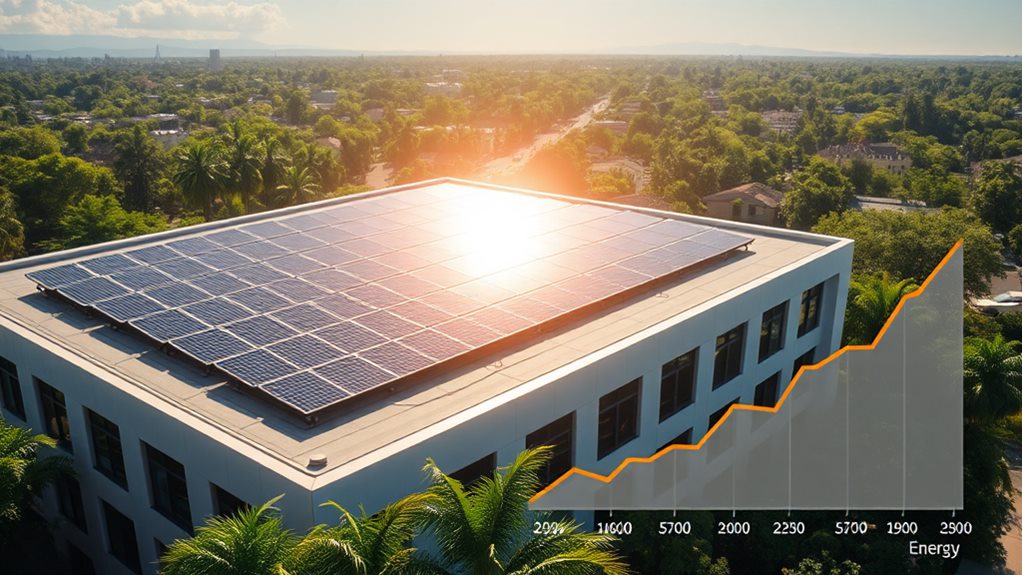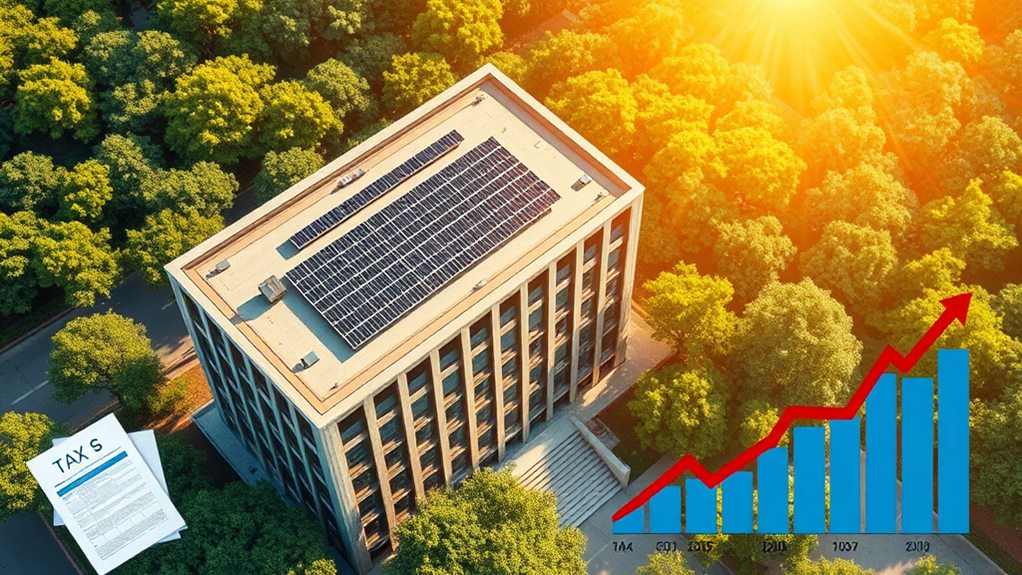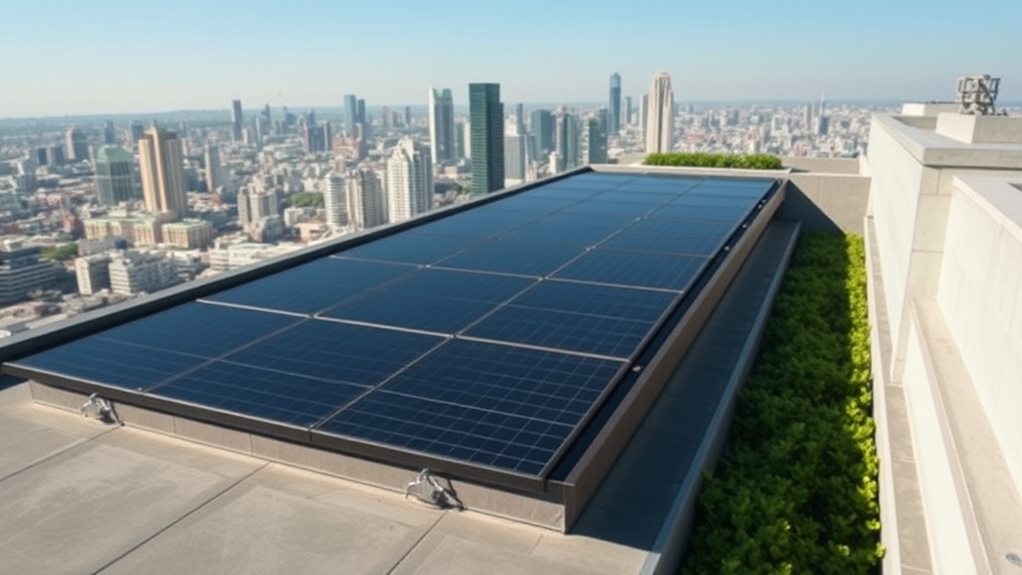Utilizing solar energy provides companies with various benefits, including significant reductions in energy costs, with potential annual savings around $101,259 by offsetting electricity use. Enhanced energy security means you'll have a reliable power source, reducing disruptions during outages. Financial incentives, such as tax credits and local programs, make installation more affordable while supporting cash flow. In addition, committing to solar aligns your business with sustainability goals, appealing to environmentally conscious consumers, and potentially expanding your customer base. Finally, solar installations require minimal space and operate quietly, creating a more productive work environment. Explore the advantages further to see how they can impact your business.
Reduced Energy Costs

Reduced energy costs are one of the most compelling reasons for companies to invest in solar energy. By installing solar energy systems, you can greatly reduce your monthly utility expenses, potentially saving thousands. In fact, commercial solar panels can cut energy costs by up to 75%. This remarkable reduction helps businesses achieve financial stability by lessening reliance on traditional energy sources, which often experience price fluctuations.
Additionally, many businesses can benefit from immediate financial incentives such as state and federal tax credits that further enhance savings.
With the average commercial building facing yearly energy expenses of approximately $7,800, the potential to offset electricity consumption by up to 90% means substantial savings, averaging around $101,259 over time. The average payback period for solar installations is between 3 to 5 years, after which companies can enjoy these savings as pure profit.
Moreover, solar systems provide a consistent energy supply, which reduces operational disruptions linked to power outages. By investing in solar energy, you're not only mitigating energy expenses but also positioning your business for long-term financial health and sustainability.
Embracing solar energy is a smart choice that can lead to both immediate and long-term economic benefits, making it an attractive option for forward-thinking companies.
Enhanced Energy Security
Investing in solar energy not only cuts costs but also enhances your company's energy security. By reducing dependence on the national grid, solar installations provide a more reliable and independent energy source. This shift allows you to navigate the complexities of energy management with greater ease, safeguarding your operations against external disruptions.
Additionally, many companies find that switching to solar can lead to substantial long-term savings on utility costs, which can be redirected to other business investments.
Here are some key benefits of enhanced energy security through solar power:
- Backup power: On-site energy storage solutions, like battery systems, guarantee you have backup power during outages, increasing energy resilience.
- Operational stability: With solar energy systems, you can maintain productivity levels during power cuts, minimizing operational disruptions.
- Cost control: Utilizing solar power gives you increased control over your energy usage, allowing for better planning and budgeting amidst fluctuating energy prices.
Financial Incentives and Tax Benefits

When it comes to solar energy, taking advantage of financial incentives and tax benefits can greatly lighten your initial investment burden. One major advantage is the Federal Investment Tax Credit (ITC), which allows you to claim a 26% tax credit on your solar installation costs, effectively reducing your upfront expenses.
Additionally, Solar Renewable Energy Credits (SRECs) enable you to recover installation costs based on the energy your system produces, earning one SREC for every 1,000 kilowatt-hours generated. Many local governments also offer various programs to assist in financing solar panel installations, additionally enhancing the affordability of switching to solar energy.
The Modified Accelerated Cost Recovery System (MACRS) additionally enhances your financial situation, allowing you to depreciate solar panel costs over five years, which improves your cash flow and maximizes tax benefits.
Also, through net metering, you can receive credits for any excess energy your system sends back to the grid, adding to your energy savings.
On average, commercial solar installations can offset up to 90% of your electricity consumption, translating to substantial savings of approximately $101,259 over the lifespan of the system.
Commitment to Sustainability
Commitment to Sustainability
Embracing solar energy not only brings financial benefits but also showcases your company's commitment to sustainability. By adopting renewable energy, you greatly reduce your carbon footprint and align with global efforts to combat climate change. This proactive stance enhances your brand image, especially since 83% of consumers favor companies that engage in environmental, social, and governance (ESG) practices.
Additionally, companies like Upper Solar demonstrate a commitment to building a sustainable future through each solar system installation, contributing to a healthier planet team approach to sustainability.
Consider these key advantages:
- LEED Certification: Achieving this certification demonstrates your dedication to sustainable building practices, boosting your credibility.
- Customer Loyalty: Environmentally conscious consumers are willing to pay more for sustainable products, which can increase your customer base.
- Job Creation: Investing in renewable energy infrastructure supports local economic growth and creates jobs in your community.
Minimal Space and Noise Requirements

Solar energy systems offer a practical solution for businesses with limited space and noise concerns. Unlike traditional energy sources, solar installations typically require minimal space, making them suitable for both large and small environments. You can optimize energy generation by utilizing rooftops or underused land, ensuring efficient use of your available space. This capability means you can maintain your operational area while still investing in renewable energy.
Moreover, solar energy systems operate silently compared to mobile generators, considerably reducing noise complaints in both residential and commercial areas. This aspect contributes to a more peaceful environment, enhancing your working atmosphere. Employees can focus better without the distractions of loud machinery, leading to increased productivity.
Additionally, solar carports or canopies can be installed to provide both energy generation and functional space for parking or outdoor areas. This dual-purpose approach maximizes your functionality while addressing space constraints.
Final Thoughts
Incorporating solar energy into your company's operations not only reduces energy costs but also enhances your energy security and aligns with sustainability commitments. With financial incentives available, shifting to solar is a strategic investment. Have you considered how embracing renewable energy can elevate your brand's reputation while contributing positively to the environment? By adopting solar technology, you're not just making a smart business decision; you're also paving the way for a more sustainable future.


Recent Comments